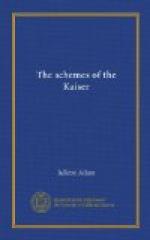One day, on the occasion of a first performance of a play called “Cadio,” by George Sand, I was with a woman, my best friend, in the wings of the theatre, Porte-Saint-Martin. I saw Melingue stamping on the floor with his feet and jumping and twisting about, and upon my asking him what was the meaning of these extraordinary antics, he replied; “It is because, when I come upon the scene, I am supposed to have galloped several miles on horseback and it would not do for me, therefore, to present the appearance of a gentleman who has just come out of a room or from the garden.” I do not quite know why I should have remembered this far-off incident on learning that the German Emperor, King of Prussia, had come on horseback from Potsdam to open the new Reichstag. As a comedian, William II does not follow the methods of Melingue. He rides, in order to present a calmer appearance at his entry upon the scene. Clad in the uniform of a Hussar, he read the speech from the throne with an evangelical mildness. He was playing the part of a soldier-clergyman. The soldier said—
“My august allies agree with my conviction that the Empire, in view of the development of military institutions by other Powers, can no longer delay to give to its armed forces such increase as shall guarantee the security of its future.”
The clergyman had upon his lips the honey of promises of concessions, and he concluded with these words, added to the speech from the throne—
“And now, gentlemen, may the Lord grant His blessing to every one of us, for the successful issue of a meritorious work in the interests of our country. Amen!”
In the course of the latest discussion of the military law in the Reichstag, we have been able to gather certain unforgettable information. In the first place, Von Caprivi has told us that the increase of the army is directed really and more especially against France. Herr Richter declares that Germany, single-handed, can carry through victoriously any struggle against us. Liebknecht says that Turkey can hold Russia in check together with Poland, and finally, that: “Germany counts upon England as surely as upon Austria and upon Italy.”
September 13, 1893. [9]
The Emperor, King of Prussia, has addressed to our brothers that are cut off from us, the following words—
“You are Germans, and Germans you will remain; may God and our good German sword help us to bring it to pass.”
To which words, every Frenchman has replied—
“They are French and French they shall remain, God and our good French sword helping us.”
Calmly we await the final provocation. The German manoeuvres have only served to teach us one thing more, viz. that William II wishes us to know that the moment is at hand for a last challenge. All the German Sovereigns who were present at the manoeuvres in Alsace-Lorraine, appeared to be weary of the supremacy which William, the hot-headed, asserts throughout all the territory of the Empire. Certain of their number stated in the presence of several people whose sympathies are with the French, that the Emperor of Germany was no more master of the proceedings than they themselves, and that they had no intention of figuring either as members of his suite or of his general staff, in accordance with the wish which he had expressed to Von Caprivi.




